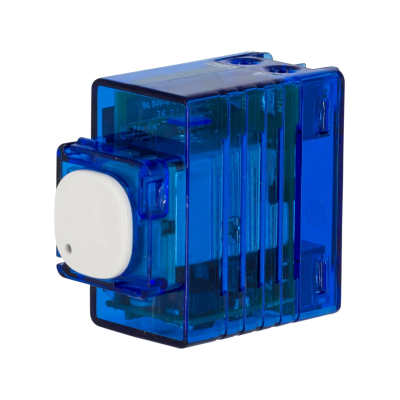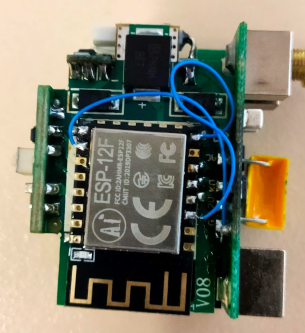DETA Mechanism Switch (6014HA)
General Notes
A smart switch that does not require a neutural, needs a minumum 20w load or a load correction device
Available from Bunnings

GPIO Pinout
| Pin | Function |
|---|---|
| GPIO12 | Blue LED (Inverted: true) |
| GPIO14 | Button |
| GPIO16 | Relay |
Conversion
To use ESPHome, replace the WB3S with a ESP12F.
- Link GPIO15 to Gnd (recommended via 10k resistor)
- Link EN to Vcc (recommended via 10k resistor)
Due to limited space, conversion below ommited the resistors. No issues but it is outside specifications.

Configuration
substitutions:
name: "deta-6014-01"
friendly_name: "DETA 1G"
project_name: "DETA.60141HA"
project_version: "1.0"
device_description: "Deta 6014HA Light Switch"
esphome:
name: "${name}"
comment: "${device_description}"
project:
name: "${project_name}"
version: "${project_version}"
esp8266:
board: esp12e
# Enable logging
logger:
# Enable Home Assistant API
api:
encryption:
key: "your key"
ota:
password: "your password"
wifi:
ssid: !secret wifi_ssid
password: !secret wifi_password
# Enable fallback hotspot (captive portal) in case wifi connection fails
ap:
ssid: "Deta-6014Ha-01 Fallback Hotspot"
password: "fallback password"
captive_portal:
sensor:
- platform: wifi_signal
name: "${friendly_name} wifi signal"
update_interval: 600s
- platform: uptime
name: Uptime Sensor
id: uptime_sensor
update_interval: 60s
disabled_by_default: true
on_raw_value:
then:
- text_sensor.template.publish:
id: uptime_human
state: !lambda |-
int seconds = round(id(uptime_sensor).raw_state);
int days = seconds / (24 * 3600);
seconds = seconds % (24 * 3600);
int hours = seconds / 3600;
seconds = seconds % 3600;
int minutes = seconds / 60;
seconds = seconds % 60;
return (
(days ? to_string(days) + "d " : "") +
(hours ? to_string(hours) + "h " : "") +
(minutes ? to_string(minutes) + "m " : "") +
(to_string(seconds) + "s")
).c_str();
#################################
output:
# Button
- platform: gpio
pin: GPIO16
id: relay1
light:
# Top (or only) button
- platform: binary
name: "${friendly_name} Light"
output: relay1
id: light1
on_turn_on:
- light.turn_on: status1
on_turn_off:
- light.turn_off: status1
- platform: status_led
id: status1
pin:
number: GPIO12
inverted: true
# Buttons
binary_sensor:
# Button
- platform: gpio
pin:
number: GPIO14
mode:
input: true
pullup: true
inverted: True
name: "${friendly_name} Button"
#toggle relay on push
on_press:
- light.toggle: light1
button:
- platform: restart
id: restart_button
name: "${friendly_name} Restart"
disabled_by_default: true
text_sensor:
- platform: wifi_info
ip_address:
name: "${friendly_name} IP Address"
disabled_by_default: true
bssid:
name: "${friendly_name} BSSID"
disabled_by_default: true
- platform: template
name: Uptime
id: uptime_human
icon: mdi:clock-start